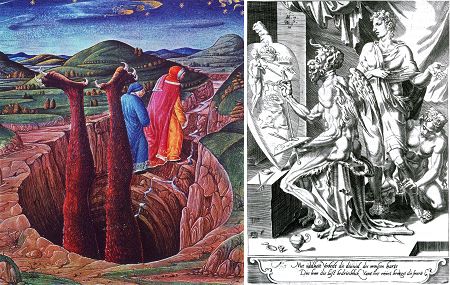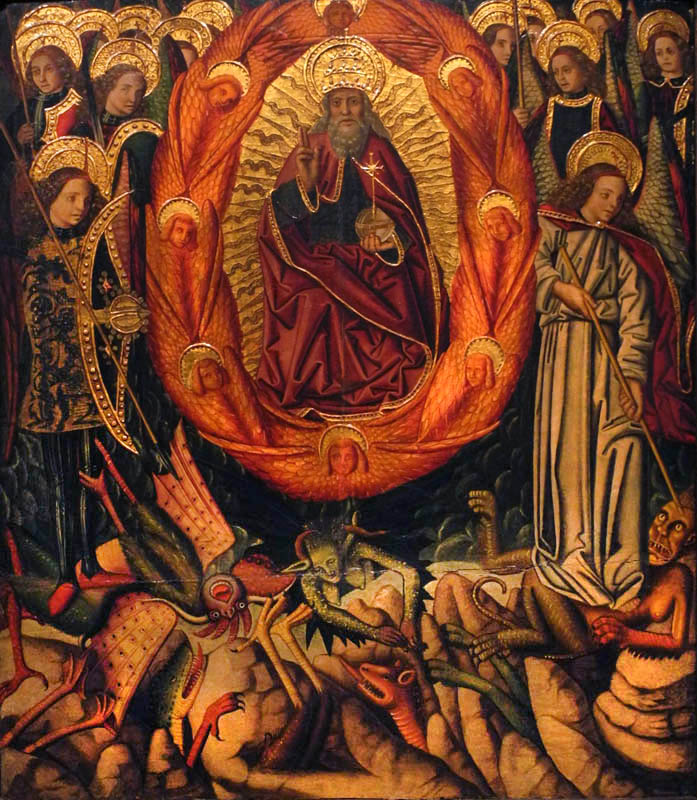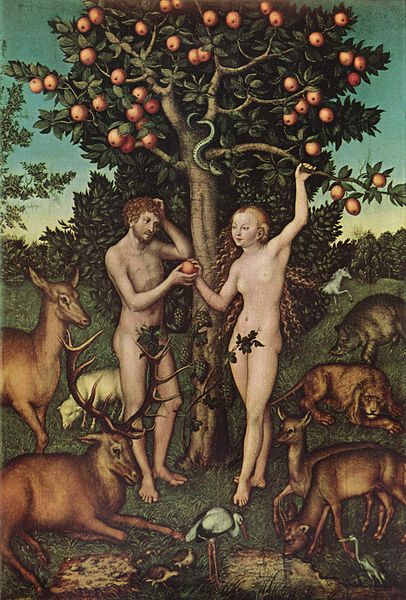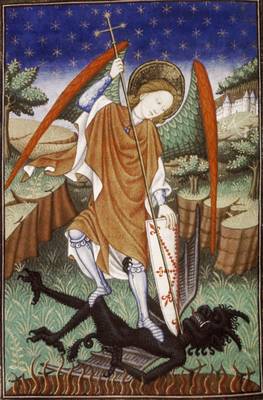Once upon a time – in the 11th century to be exact – a priest – after much reflection and observation of the natural world, suggested to the Pope there might be laws of nature to explain the workings of the plants, the seasons and the cycles of night and day. To which the Pope shouted: “There are no laws of nature, only laws of God!”
He then had that heretical priest hung.
Shortly afterwards, the Pope was killed when a piece of poorly built ceiling – obeying the laws of gravity – fell on him while he slept.
Four hundred years later, despite considerable progress unraveling the mysteries of the physical world, religion in the Late Middle Ages still defined people’s lives.

Most common people in the Middle Ages didn’t go to the doctor when they were sick. For one thing, they couldn’t afford to. For another, they attributed their afflictions to sinful behaviour that had incurred God’s wrath. So they prayed for God’s mercy. Sometimes it worked. Often, it didn’t. In The Infidel’s Garden, Yolente, who would these days be diagnosed as an alcoholic, blamed her illness and misfortunes on all manner of evil forces, including her infidel servant Marjit. As was common among the well-to-do, she also paid pilgrims to travel to the Holy Land with special prayers to cure her of what would eventually become cirrhosis of the liver. I’m sure the pilgrims did a roaring trade. Not sure though, if it helped with people’s problems. It certainly didn’t help Yolente.

While Christianity still clung to literal interpretations of Biblical texts, Islamic thought had segued more into a more abstract view of the world. With a more rational and less superstitious approach to the whole conundrum of existence, Islam tried to make sense of the natural world through study of rainbows, the chemistry of plants, medicine, and development of mathematical principles. Marjit, thanks to her Sufi upbringing, arrived in Hertogenbosch with a more reasoned approach to faith and struggled to accept many of the backward Christian doctrines she encountered.
After Frau Kikkert, housekeeper at The Lord’s Embrace, accuses her of consorting with Lucifer, Marjit silently fumes:
Ah! How I ache to say a thousand things then! I want to point out that before Islam the world had descended into a dark and superstitious age (yes, even worse than this age) which the teachings of the prophet Muhammad dispelled. I want to point out to that fool of a woman that the Arab world gave the West knowledge and many gifts including the water clock, algebra and the artichoke.
Yet the Church, supported by a Monarchy wanting to maintain power, had a vested interest in perpetuating Christianity’s more backward beliefs, doctrines and traditions. Including the belief that humankind’s problems could all be traced back to Eve and that apple.

In The Infidel’s Garden, self-serving idiots like Gerrit use select ecclesiastical references to justify his treatment of women:
“…woman is the devil’s gateway. She is the un-sealer of the forbidden tree and the first deserter of the divine law.”
Archdeacon Solin also uses the Church’s creations –fear, damnation and sin, along with the evangelically promoted solution – heaven, paradise and eternal bliss in the afterlife – to ensure the loyalty of his flock who are keen to avoid a very uncomfortable and eternal afterlife in hell .Sermons were a fabulous way of emphasizing the dangers of lapsing from the church. This is where Archdeacon Solin thrived:
“The vain among you, those of who think you know God’s mysteries and seek to challenge the Church will be punished in hell by the devil!”
Thanks to all this ideological skulduggery, many clergy lost touch with the core values of the faith they professed to follow.

However, Rutger, our anarchic dwarf, sees through all this propaganda:
“True love, like true religion is tolerance, unity and compassion. It is not the mindless adherence to the dead doctrines of the past, or marriage to a false ideal, but submission to the endless state of flux that is the force of life.”
The pressures to conform during this period of history must have been enormous for the good people in positions of responsibility who wished to remain true to Christianity’s core values. Which is why Mother Geertruyt always looked so tired. And why Brother Regiomantus was hung.
Islam

As well as fending off the Spanish Inquisition, Islam had its own internal conflicts. Muhammad’s huge and mostly successful efforts to unite warring tribes and emphasize the importance of community went to pieces after his death. A schism between the Sunnis and the Shi’ites erupted. Sufism, the mystical branch of Islam, had many detractors as well; its followers often accused of being disrespectful of Sharia laws. Then of course there’s that issue of the status and treatment of Muslim women – as Atiq bluntly reminds everyone :
“A woman belongs in the house or in a grave!”
Which is why, back in Vertientes, the tolerant and more open minded Mullah Fiazan always looked tired as well.
Here’s a link to more:

